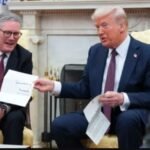Keir Starmer faces criticism from his own party over his stance on the conflict
Labour leader Keir Starmer is under pressure from some of his MPs and local council leaders to take a stronger position on the escalating violence between Israel and Hamas. Starmer has been accused of being too timid and vague in his response to the crisis, which has claimed the lives of over 200 people, mostly Palestinians, in the past week.
Starmer has condemned the rocket attacks by Hamas and called for an end to the violence, but he has stopped short of calling for an immediate ceasefire, as some of his shadow cabinet members and backbenchers have done. He has also faced backlash for not attending a pro-Palestinian rally in London last weekend, where some of his MPs spoke.
Some Labour figures have publicly challenged Starmer’s leadership on the issue, such as Anas Sarwar, the Scottish Labour leader, Sadiq Khan, the mayor of London, and Andy Burnham, the mayor of Greater Manchester. Two Labour council leaders, Basildon’s Gavin Callaghan and Preston’s Matthew Brown, have even called for Starmer to resign over his handling of the conflict.
Richard Burgon to resubmit motion for ceasefire when parliament resumes
One of the most vocal critics of Starmer’s position is Richard Burgon, the former shadow justice secretary and a prominent ally of former leader Jeremy Corbyn. Burgon has confirmed that he will be resubmitting an early day motion to press the government to support a ceasefire when parliament is recalled next week.
The motion, which was backed by 94 MPs before parliament was prorogued last week, urges the UK government to “use all diplomatic avenues possible” to secure a negotiated ceasefire that is binding on all parties. The motion also calls for the government to recognise the state of Palestine and to impose sanctions on Israel for its violations of international law.

Burgon said: “Over 10,000 people in Gaza and Israel have already lost their lives in the last month alone. Preventing the deaths of any more civilians must be our top priority.”
The motion was supported by many SNP MPs, both of Alba’s MPs, and several Labour left-wingers, including some shadow ministers such as Imran Hussain. Liam Byrne, a former chief secretary to the Treasury under Gordon Brown and a member of Labour’s right-wing, also signed the motion.
Government defends its response and rejects sanctions on Israel
The UK government has defended its response to the conflict, saying that it is working with international partners to urge both sides to de-escalate and restore calm. Foreign Secretary Dominic Raab has spoken to his Israeli and Palestinian counterparts, as well as the US Secretary of State Antony Blinken, to convey the UK’s concerns and call for a peaceful resolution.
However, the government has rejected the idea of imposing sanctions on Israel, saying that it does not believe that such measures would help to achieve a lasting peace. The government has also reiterated its support for Israel’s right to self-defence, while urging it to act proportionately and avoid civilian casualties.
The government has also faced criticism from some Conservative MPs, who have accused it of being too soft on Hamas and not standing firmly with Israel. One Tory MP, Robert Halfon, said that the UK should be “unequivocal” in its support for Israel and condemn Hamas as a terrorist organisation.
International efforts to broker a ceasefire continue amid rising tensions
The international community has been trying to broker a ceasefire between Israel and Hamas, but so far without success. The UN Security Council has held several emergency meetings, but has failed to agree on a joint statement due to the opposition of the US, which has veto power.
The US has said that it is engaging in “quiet, intensive diplomacy” to end the violence, but has also expressed its unwavering support for Israel’s security. President Joe Biden has spoken to Israeli Prime Minister Benjamin Netanyahu several times, and has said that he expects a “significant de-escalation” soon.
However, Netanyahu has vowed to continue the military operation until Hamas’s “terrorist infrastructure” is destroyed. He has also rejected any external pressure to stop the fighting, saying that “no one can dictate to us actions that ensure our security”.
Meanwhile, Hamas has said that it will not stop firing rockets until Israel lifts its blockade on Gaza and stops its “aggression” in Jerusalem. The Islamist group has also demanded the release of Palestinian prisoners and the protection of the Al-Aqsa mosque, which has been the flashpoint of the recent unrest.
The conflict has sparked protests and clashes around the world
The conflict between Israel and Hamas has not only caused death and destruction in the Middle East, but has also sparked protests and clashes around the world. Thousands of people have taken to the streets in various countries to express their solidarity with either side, or to call for an end to the violence.
Some of the protests have turned violent, with reports of attacks on synagogues, mosques, and Jewish and Muslim individuals. In Germany, police have arrested dozens of people for allegedly throwing stones and bottles at a synagogue in Berlin. In France, police have banned pro-Palestinian rallies in Paris, citing the risk of public disorder. In the UK, police have launched an investigation into a convoy of cars that drove through London with anti-Semitic slogans.
The conflict has also exposed the divisions and tensions within some communities and countries, especially those with large Jewish and Muslim populations. Some political leaders have appealed for calm and unity, while others have taken sides and inflamed the situation.
Will the UK parliament be able to make a difference in the conflict? Will Keir Starmer be able to unite his party and regain the trust of his supporters? Will the international community be able to broker a ceasefire and prevent further bloodshed? These are some of the questions that remain unanswered as the crisis continues.


















